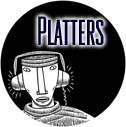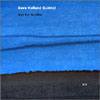
Comment
on this story
The Ultimate Halloween Mix Tape
MP staffers select their favorite scary music. No "Monster Mash" allowed.
|
 |

This Week: Adair celebrates Porter, Holland spins a web, and Bley/Parker/Phillips record in a monastery
Beegie Adair
Dream Dancing: Songs of Cole Porter (Hillsboro)

Have a yen for the jazz standard? Consider Dream Dancing, Nashville pianist Beegie Adair's latest recording, a collection of 14 Cole Porter tunes, lovingly rendered by piano, bass, and drums trio.
While jazz fans occasionally delve into fusion, gamelan, raga, perhaps even rock, the comforts of Tin Pan Alley are always returned to like a well-worn slipper. Dream Dancing is just such an album, the comfort recording, a homecoming. Adair is neither literalist nor libertarian when it comes to these chestnuts. Each melody is clearly stated, and then developed in the spirit of the tune. No returns to basic principle or deconstructions of form. It's a celebration of Porter, not a reconsideration.
One senses that Adair must get an enormous kick out of the huge block chord. She lingers on them, experimenting with the attack on the slow numbers ("So in Love," "Every Time We Say Goodbye"), while on the upbeat tunes ("You're the Top") it is her locked-hands chording, contrasted with arpeggios, that provide an infectious, near-funky drive.
Combine Adair's stylistic leanings with the obvious affinity between her and her bandmates, bassist Roger Spencer and drummer Chris Brown, and each tune swings mightily. One predictable yet nevertheless electrifying example is the effortless transition to trading fours late in several tunes ("I Love Paris," "What is This Thing Called Love"), opportunities for Adair and Brown to engage in some lighthearted tangling.
And so goes the album, a playful and in-the-pocket reading of these mostly familiar melodies, bringing "back the sound of music so tender/It brings back a night of tropical splendor," and fully in the spirit of Cole Porter whimsy.
—Jonathan B. Frey
Dave Holland Quintet
Not for Nothin' (ECM)

This music retraces the lines and angles Holland has been drawing ever since 1972's Conference of the Birds. The crisscrossing trajectories of horns (Robin Eubanks and Chris Potter) and vibes (Steve Nelson) outline space rather than fill it, while drummer Billy Kilson proves himself adept at beat variation. Holland's basslines are the spare elliptical cycles of motion at the center. The ensuing aural web is—like a spider's—organically and evenly constructed, fragile yet resilient, and effective in every quarter.
Holland has ever known how to write in a modern style without breaking ties to the past, and thus the title track hints at Mingus and "Cosmosis" updates hard bop. But other tunes have no obvious lineage; check "For All You Are," a sensual ballad that heads for dynamic improv terrain, or Kilson's "Bilows of Rhythm," a funky blast of not-quite fusion that could never have happened in the '70s. So integrated is this group's playing that individual moments are hard to isolate, but the diligent might note Kilson's shimmering cymbal work on "Go Fly A Kite," the evocative pairing of soprano and marimba on "Shifting Sands," and Eubanks' brawny trombone exposition on "Global Citizen." Not to mention Holland's fluid imagination as a soloist.
Harmonies flit by like ghosts, rhythms overlap, and the improvs are satisfyingly even-keeled. Not for Nothin' isn't much of an advance beyond the Quintet's first two albums, but why fix what ain't broke? This is clearly one of the most original ensembles working today, and if they've found their comfort zone, more power to them.
—Chris Mitchell
Paul Bley, Evan Parker, Barre Phillips
Sankt Gerold (ECM Records)

This is the second recorded meeting of Canadian pianist Paul Bley, English saxophonist Evan Parker, and American bassist Barre Phillips, the first being Time Will Tell in the mid-'90s. And like its predecessor, this recording consists of further distinctly European free-improvisational ruminations, this time not recorded in the studio, however, but live in an Austrian monastery (Propstei Sankt Gerold).
Bley/Parker/Phillips collaborations are some of the more accessible examples of the free improvisational form, owing to the overall lightness of touch practiced by the protagonists. Throughout, there is inventive use of each instrument, with Bley playing both piano keyboard and strings, Phillips delivering pizzicato and arco bass as well as using the bow for percussive effects, and Parker employing his signature circular breathing for sustained descants over his companions' groove.
The trio selections are studies in spontaneous interaction and unresolved encounter. Bley's right-hand clusters and scalar runs set the pace and development, with Parker and Phillips filling in above and below. The overall effect is one of free chamber music, unpredictable but calming, antecedentless and primal.
The solo cuts permit each to explore unimpeded, with Parker in particular letting fly in "Variation 10." And while the setting is agreeable for all of the instrumentation, Parker's soprano saxophone is especially sympathetic to the monastery's harmonics.
Albeit abstract in the way of free improvisation, Sankt Gerold nevertheless represents a contemplative and liberating listening experience, offering avenues of appreciation even for those less inclined to such unstructured sound.
—Jonathan B. Frey

October 25, 2001 * Vol. 11, No. 43
© 2001 Metro Pulse
|





